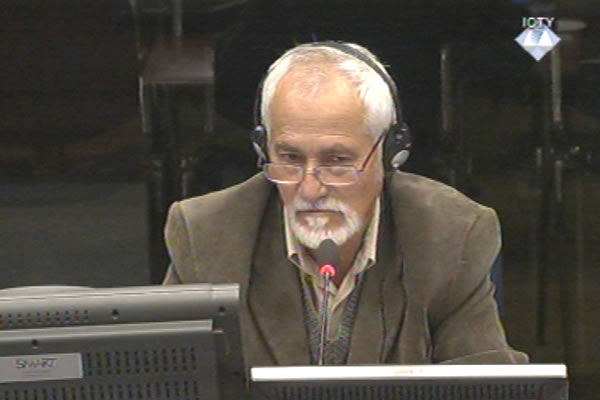Home
‘HUMANITARIAN’ AGENCY ORGANIZED EXODUS
Milos Bojinovic from Banja Luka testified at Radovan Karadzic’s trial. He claimed that the Agency for the Movement of People and Exchange of Property did ‘humanitarian work’. According to Bojinovic, this was not part of an organized effort to get the non-Serbs to move out as the prosecution has alleged
 Milos Bojinovic, witness at the Radovan Karadzic trial
Milos Bojinovic, witness at the Radovan Karadzic trial Milos Bojinovic, former head of the Agency for the Movement of People and Exchange of Property in the Autonomous Serb Region of Krajina, gave evidence at Radovan Karadzic’s trial. According to the summary of Bojinovic’s statement from the trial of Radoslav Brdjanin, the Agency did ‘humanitarian work’. The Agency’s main tasks were to help people establish contact for the purpose of selling or buying property and to provide transport for their smooth departure from Krajina.
Individuals who wanted to leave had to unregister from their current place of residence to get ‘the deregistration certificate’. They also had to get a certificate from the local police that they didn’t have a criminal record. When they obtained the two documents, they applied to the Agency for bus tickets to Gradiska and Vlasic. Mr. Segrt and Mr. Bandic, the Agency clerks, checked the security situation and decided if the buses needed police escort. Also, the two of them verified that the travelers had the letters of guarantee from the countries they wanted to go to.
In the cross-examination, prosecutor Ann Sutherland noted that it was in fact the organized exodus of Muslims and Croats from Krajina. The prosecutor recalled the testimony of previous witnesses, who said that they had to pay 100 to 300 German marks for a one-way ticket. Also, the prosecutor noted that some defense witnesses, like Andjelko Grahovac and Nikola Erceg, confirmed that hundreds of non-Serb businesses had been ‘blown up’. She reminded the court of Vojislav Kupresanin's statement that he heard Brdjanin was saying less than a thousand Muslims would remain in Banja Luka.
Those, the prosecutor suggested, were the real reasons why people waited in queues in front of the Agency. Each day the Agency processed about 500 requests for departure. Bojinovic denied the allegation, claiming that the people left voluntarily, because of the war and general insecurity. It was not true that the tickets cost from 100 to 300 German marks, Bojinovic argued. The price was much lower and in line with the laws in force, he explained. Bojinovic also said that on their departure, ‘his Muslims’ offered him money but he refused to take it. Bojinovic even gave them money because they needed it more.
Bojinovic never saw any non-Serb citizens being harassed in any way in Banja Luka. He did hedge his claim by explaining that Banja Luka is such a big town that it could have happened without him seeing it. He nevertheless chose not to believe those who actually had seen it, including British journalist Ian Traynor. In one of his reports, Traynor wrote that foreign humanitarian workers were appalled at the level of hate and abuse suffered by the Muslims in Banja Luka on a daily basis. ‘How can you read hatred on someone’s face, this really makes no sense’, the witness remarked.
After Bojinovic completed his evidence, Karadzic called the first, and so far the only, former BH Army soldier who agreed to testify in his defense, with protective measures and underthe pseudonym KW 012.
Linked Reports
- Case : Karadzic
- 2013-12-08 KARADZIC FEARS THAT AMERICA EAVESDROPS ON HIM IN THE HAGUE
- 2013-12-06 PEOPLE MOVED OUT OF SANSKI MOST VOLUNTARILY, NOT BECAUSE THEY WERE FORCED TO
- 2013-12-05 ‘VOLUNTARY EVACUATION’ FROM SANSKI MOST AND KLJUC
- 2013-12-10 EYEWITNESS TO ALL KARADZIC’S ‘CONSPIRACY THEORIES’
- 2013-12-11 SENSATIONAL INFORMATION FROM ‘SERBIA’S FRIEND IN NATO’
- 2013-12-11 KARADZIC’S ‘TEXTBOOK LESSON IN DEMOCRACY’
